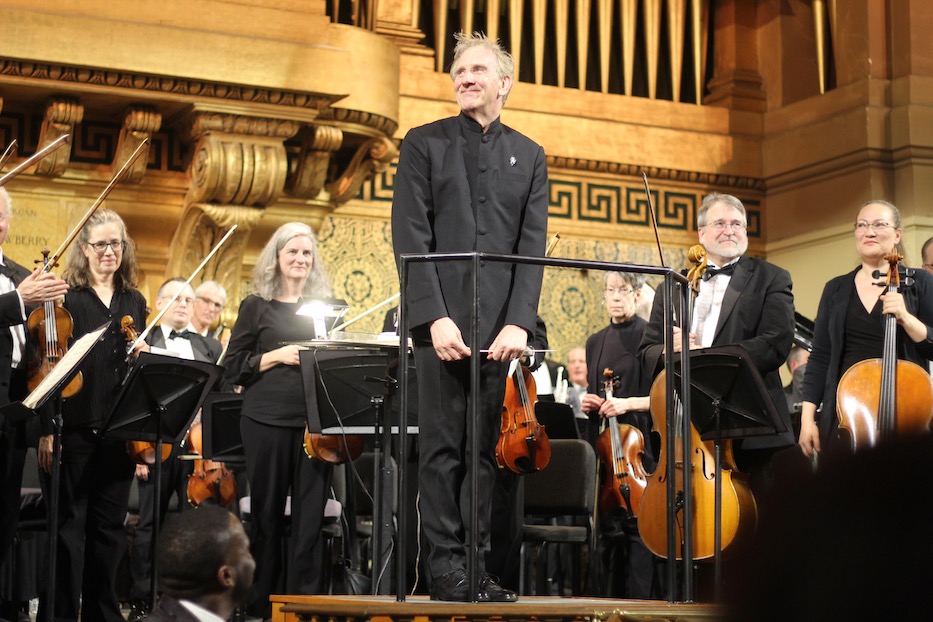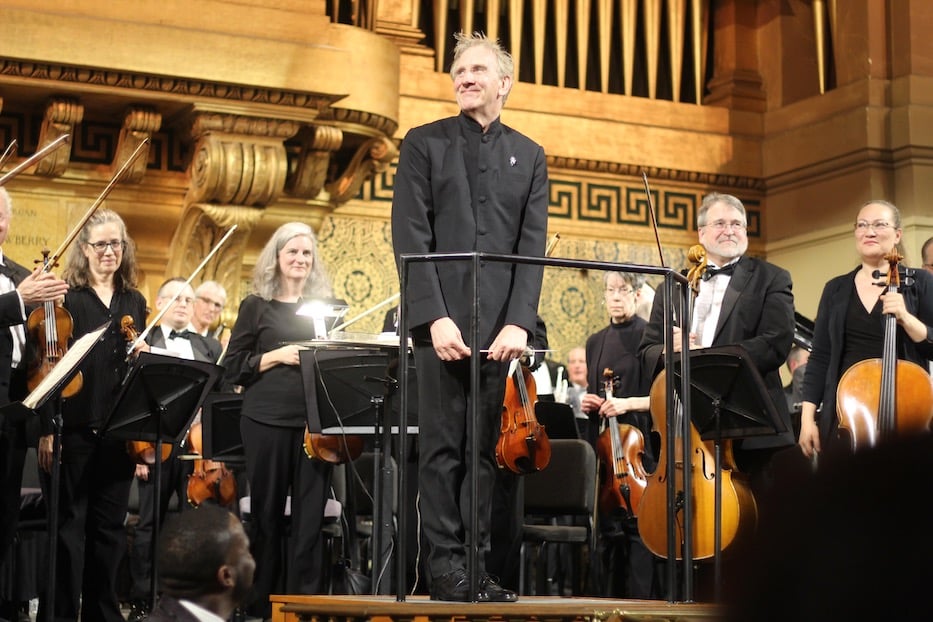
Culture & Community | Music | Arts & Culture | Musicians | New Haven Symphony Orchestra

Maestro Alasdair Neale and musicians of the New Haven Symphony Orchestra at the organization's opening concert earlier this year. Lucy Gellman File Photo.
The New Haven Symphony Orchestra’s musicians have voted to authorize a strike—but the triumphant “Hallelujahs” of Handel’s Messiah will still ring out this weekend, as the union-organized violinists, trumpeters, cellists and others continue to negotiate with management for better pay, in a bid to avoid a looming work stoppage.
That labor unrest looms over the organization as it closes out its busy season of holiday concerts.
That news came out of the New Haven Symphony Orchestra and the American Federation of Musicians Local 400 this and last week, as musicians continue to press management for higher wages. On the cusp of the new year, it marks a season of increased uncertainty for the NHSO, as musicians and members of AFM Local 400 try to reach a collective bargaining agreement that will result in higher wages for the symphony's roster of 65 musicians.
Those negotiations have become more frequent following a vote to authorize a strike last weekend, before two holiday pops performances in Shelton and New Haven. They have continued this week, leading into a weekend of holiday concerts in Madison and New Haven.
"We all love doing what we do, but this is a job," said Andrew Trombley, a double bassist with the symphony who sits on the NHSO Orchestra Committee, in an interview with the Arts Paper. Of the NHSO's 65 professional musicians, he noted, most belong to multiple symphony orchestras, teach at music schools, and have robust studio practices of their own just to make ends meet. “We want to receive a wage that is reflective of the wealth that the symphony has been able to come into in the past year.”
At the center of negotiations is a debate over money—who has it, how much, and where it should go.
AFM Local 400 has been negotiating with NHSO leadership for well over a year, pressing management for a 28 percent wage increase for the unionized musicians. Musicians currently make a “base section rate” of $119 per two-and-a-half hour service, or roughly $48 per hour. A service constitutes a rehearsal or concert performance; more on that below.
NHSO Orchestra Committee members and labor leaders point to the symphony’s receipt of nearly half of the $35 million James D. English Fund as evidence that the symphony has the money to increase their compensation, and that the people who make the music deserve better pay.
NHSO leadership, meanwhile, has offered a 22 percent raise for the symphony’s musicians over the next four years, including an immediate nine percent increase. They’ve also pointed to the orchestra’s $300,000 operating deficit and post-pandemic declines in audience attendance. As for the English Fund, that hefty gift is more complicated—and less immediately accessible—than one might think.
"We recognize that we have tremendously talented people who have been through a tremendously difficult time," said NHSO President and CEO Elaine Carroll, who has been with the NHSO since 2011, in a phone conversation with the Arts Paper Tuesday afternoon. "We’re offering what we feel we can at this time."
Symphony leadership has been in negotiations with an NHSO Orchestra Committee that includes musicians Tom Hudson, Andrew Trombley, Remy Taghavi, Rebecca Patterson, Patricia Smith and Marta Bortagis and AFM Local 400 President Joseph Messina and Secretary Candace Lammers. It is an all-volunteer body, meaning that members receive no compensation for hours of weekly negotiations during which they may be losing other work and sources of income.
The negotiations, only bits and pieces of which the NHSO Orchestra Committee would share, shed light on both what musicians are making and how audiences have been slow to return to arts programming since Covid-19 first hit New Haven nearly four years ago. In April 2022—two months before their last contract was set to expire—members of AFM Local 400 began negotiating with NHSO leadership, asking for a 28 percent raise to what is called a “base section rate.”
That term constitutes a standard fee that a unionized musician is paid per two-and-a-half hour “service”—in other words, a rehearsal or concert. Currently, the NHSO's base section rate is $119, or roughly $48 per hour. For NHSO musicians, Trombley said, that looks like bringing home between $4,000 and $5,000 per year. Meanwhile, musicians’ salaries have been frozen since 2021, as both inflation and the cost of living have rapidly increased in the state and the country.
In almost two years of negotiations, NHSO leadership has offered to increase the base section rate by 22 percent over four years, starting with an immediate nine percent increase in 2023. If put into effect immediately, that would bring $119 to $130, according to a Dec. 15 letter from the Orchestra Committee. It is “a salary today that has the same spending power as $115 in 2021, $4 less than our final salary of our expired agreement,” the committee writes.
“We are effectively working at reduced wages, and we need raises now,” reads the letter, pointing to salary increases among leadership that have not trickled down to musicians (in 2022, Carroll made $166,160, according to the NHSO’s public tax filings). “The Musicians of the NHSO are undervalued. Management must understand that orchestras cannot balance the deficit on the backs on Musicians. This flawed strategy threatens the artistic excellence of the New Haven Symphony Orchestra and will tarnish our 128-year history.”
That pay also “does not take into account” the sheer amount of labor that goes into each performance, Trombley said in a phone call Wednesday. For instance, NHSO musicians may spend hours rehearsing new and familiar repertoire at home, or drop hundreds of dollars on routine instrument maintenance and repairs. All of that labor is uncompensated, because it does not take place at a formal rehearsal or concert.
For NHSO leadership, Carroll said, the calculation isn’t that simple. For the past two years, the symphony has been operating at a six-figure deficit, pulling from its cash reserves and what’s left of federal pandemic relief funding. Over three years after Covid-19 shut down Maestro Alasdair Neale’s inaugural season, box office numbers have also not returned to what they were before the pandemic. Carroll doesn’t know if they ever will: fewer people are attending live arts events than were in the years leading up to 2020.
For Trombley and other members of the Orchestra Committee, that deficit isn’t enough of a reason not to raise wages more swiftly. Last year, the Community Foundation for Greater New Haven announced the record-shattering $35 million gift of James D. English, 40 percent of which is earmarked for the NHSO. That translates to roughly $14 million, which is parked at the Community Foundation and set to capitalize through 2027.
Last year and again this year, the organization received a chunk of that funding (the Community Foundation would not disclose how much; its 2022-2023 annual report shows a total of $1,283,743 going to the organization). Starting in 2027, Carroll said that the NHSO will receive 4.5 percent per year in perpetuity.
“We extend tremendous gratitude to the English family,” she said in a phone call earlier this week. “We’re only having these conversations because of this gift.”
For musicians, it’s not enough. Several members of the NHSO Orchestra Committee have seen peers achieve similar negotiations, and believe that it's possible. In October, following 17 months of negotiations, AFM Local 400 and the Hartford Symphony Orchestra reached a collective bargaining agreement in which musicians received a 20 percent wage increase. Last year, the organization also reported a $600,000 deficit.
This month, the conflict came to a head after NHSO musicians voted to authorize a strike on December 8, shortly before a weekend of holiday pops concerts that ultimately continued as planned (of the NHSO's roster of 65 musicians, it was not immediately clear how many voted to authorize and how many voted against the strike authorization; the vote was conducted by secret ballot). Then this week, on the cusp of two more blockbuster performances, holiday negotiations continued without a resolution.
On Friday afternoon, the NHSO Orchestra Committee released a short statement that this weekend’s performances of Handel’s Messiah would continue as planned, despite frustration with present negotiations and the sense that “management did not make any meaningful attempts to bargain.” The committee added that NHSO Board President Keith Churchwell had authorized an emergency board meeting on Monday, following the concerts.
“Their ‘concessions’ included items that shouldn’t have been on the table to begin with, and any minuscule proposed wage increases on their part were nowhere near the concessions made by musicians in an effort to reach a good-faith agreement,”the NHSO Orchestra Committee wrote in an email to the Arts Paper Friday. “Management continuously (but unsuccessfully) tried to divide the committee by attempting to drive a wedge between the Musicians of the NHSO and AFM Local 400 and demanded that we sign an agreement to rehearse and perform the Messiah this weekend or else they would declare the Musicians to be on strike.”
“We did not sign any agreement, as the right to call a strike rests solely with the Committee and no such decision was made during this negotiation. By the end of the session we were joined by the NHSO board president who gave us assurances that he would call an emergency board meeting on Monday afternoon to consider our last proposal in earnest which included major concessions from our earlier offers.”
“In the spirit of the holidays and in good faith bargaining, the committee decided that it is in the best interest of the Musicians and the community to perform the Messiah this weekend and continue the conversation next week. We still reserve our right for any job action, and audiences can expect us to leaflet the concert and see demonstrations of solidarity on the stage.”
A full letter from the NHSO Orchestra Committee is available here. Previous letters and updates, including the notice that musicians had voted to authorize a strike, are available as posts to the Musicians of the New Haven Symphony Orchestra Facebook page.

